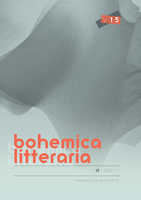Hranice nespolehlivého vyprávění
The Borders of Unreliable Narration
Author(s): Zuzana FoniokováSubject(s): Novel, Theory of Literature, British Literature
Published by: Masarykova univerzita nakladatelství
Keywords: Unreliability; implied author; possible worlds; fictional universe; fictional reality; principle of optimal departure;
Summary/Abstract: This study examines unreliable narration from the point of view of narratology. A discussion of different theoretical approaches to this phenomenon is followed by a definition of unreliable narration: a narrator is unreliable if his/her view of the fictional world differs from what the reader reconstructs as the fictional reality of the work. This definition is elucidated and specified using possible-worlds-theory in literature; this theory is also used to point out that extra-textual real--world criteria are not relevant to some kinds of fictional worlds and the narrators existing in these worlds. This argument for the “principle of optimal departure” is supported by the example of an atypical homodiegetic narrator in Kazuo Ishiguro’s When We Were Orphans. A short analysis of this novel is provided to demonstrate the existence of homodiegetic narrators that defy the role traditionally assigned to these types of narrators by literary conventions, which also means that they cannot be categorized as unreliable.
Journal: Bohemica litteraria
- Issue Year: 15/2012
- Issue No: 1
- Page Range: 101-119
- Page Count: 19
- Language: Czech

